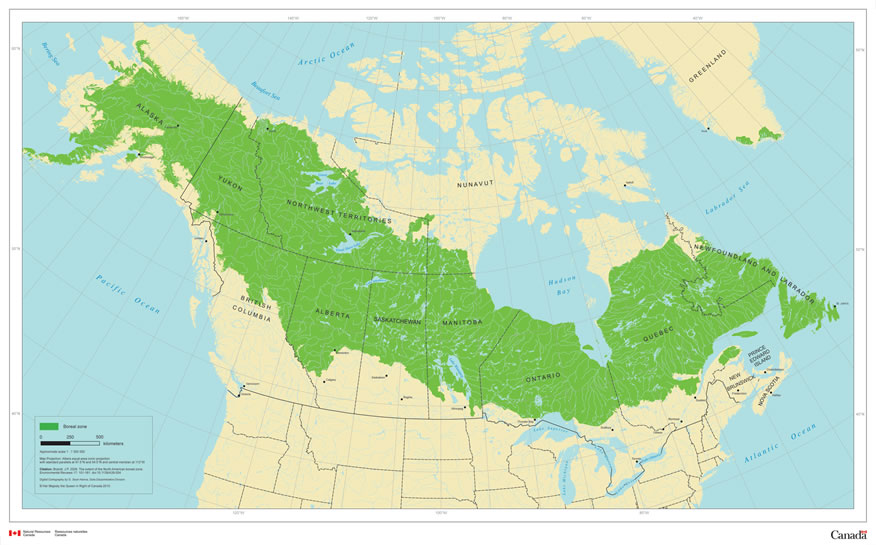Boreal forest

Canada’s boreal forest is central to the country’s natural environment, history, culture and economy. Canada respects and looks after its boreal forest in many ways, including by setting aside legally protected areas, conducting scientific research and monitoring the state of the forests.
Learn about laws and practices that ensure sustainable forest management in Canada’s boreal forest, current research into the health of the boreal forest and why our boreal forest is vital to Canada and the world.
Canada’s laws protect the boreal forest and ensure its sustainability
About 94% of Canada’s forests are on publicly owned land, which enables the government to regulate harvesting practices and apply land-use planning through legislation and other policies.
Sustainable forest management ensures that Canada’s forests are healthy, safe and thriving. It is a way of managing forests with the goal of balancing the environmental, social and economic benefits they provide over time.
Parks and protected areas maintain boreal forest landscapes, safeguard their biodiversity and provide key information for scientific research.
Harvesting in Canada’s boreal and other forests is done sustainably
Many harvesting practices in the boreal forest now imitate natural disturbances. These practices, which are based on scientific research, are meant to better mimic the effect of natural forces – such as fire and insect outbreaks – that help the forest renew itself. Such harvesting practices also address other forest management goals.
Provincial laws require that all areas harvested on public land be either replanted or allowed to naturally grow back to set standards.
Harvesting trees does not cause deforestation: harvested areas regrow. An area with very young trees is still a forest. The term “deforestation” refers to land that has been cleared of trees and permanently converted to another use.
Canada’s deforestation rate is one of the lowest in the world and has been declining for 20 years.
Scientific research on the boreal forest informs maps, management planning and policies
A large-scale review of scientific literature about the boreal zone was recently completed by Canadian Forest Service researchers (link to new boreal synthesis papers) Decision-makers can use this and other research to inform policy and planning.
A map of the boreal zone in North America was recently created by Canadian Forest Service researchers using the most current information available, consistent criteria and well-defined terms. This map, and its related statistics, is the first update of the boreal zone in nearly 40 years. The map gives scientists, governments and others a common tool for discussing the boreal region, and serves as a scientific baseline for defining the boreal zone in North America.

Download the North American boreal zone map [2.2 Mb] or the shapefiles
The boreal forest is important to Canada and the planet
Canada’s boreal forest (270 million hectares) stores carbon, purifies the air and water, and regulates the climate. Because a large portion of the world’s boreal zone lies in Canada (28% or 552 million hectares), this country’s boreal forest affects the health of the environment worldwide. Careful management of these forests therefore benefits both Canada and the world.
Canada’s boreal forest creates jobs for Canadians, and communities in the boreal zone rely heavily on the forest sector for economic stability.
Boreal forests are culturally and economically significant to Canada's Aboriginal peoples. 70% of Aboriginal communities in the country are located in forested regions.
Canada’s boreal forest, and more broadly the boreal zone, is crucial to the national economy because of the available timber and non-timber products, mineral and energy resources, and hydroelectric potential of regional rivers. The boreal forest provides food and renewable raw materials to Canadians.
Canada’s boreal forest offers unique tourism and recreational opportunities, which contribute to the local and national economies.
- Cumulative effects in Canada’s Boreal forest
- 8 facts about Canada’s boreal forest
- Spotlight: What we know about Canada’s boreal forest
- Deforestation in Canada: Key myths and facts
- Sustainable forest management in Canada: Key facts
- The boreal forest (video)
- Harvesting in the boreal forest (video)
- How natural disturbances affect the boreal forest (video)
- Series of scientific review papers on Canada’s boreal zone
- An introduction to Canada’s boreal zone: Ecosystem processes, health, sustainability, and environmental issues (2013)
- Anticipating the consequences of climate change for Canada's boreal forest ecosystems (2013)
- Effects of natural resource development on the terrestrial biodiversity of Canadian boreal forests (2014)
- Impacts and prognosis of natural resource development on water and wetlands in Canada’s boreal zone (2015)
Page details
- Date modified: